| Srl | Item |
| 1 |
ID:
092499
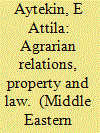

|
|
|
|
|
| Publication |
2009.
|
| Summary/Abstract |
Contrary to the prevalent tendencies of 'state-centrism' and legal formalism in the literature, this article studies the Ottoman Land Code of 1858 not as an initiator of trends but as a product of social change. The Code recognized private property on land, enlarged liberties of landholders, and pushed inheritance rules further towards gender equality. Deeply influenced by the uneven development of the capitalist relations of production, agrarian conflict, and the complex matrix of the interests of ruling groups, Ottoman land law in the nineteenth century unmistakably evolved in the direction of modern law based on the abstract individual and full commodification of land.
|
|
|
|
|
|
|
|
|
|
|
|
|
|
|
|
| 2 |
ID:
030581
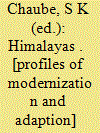

|
|
|
|
|
| Publication |
New Delhi, Sterling Publishers Private Limited, 1985.
|
| Description |
x, 238p.hbk
|
|
|
|
|
|
|
|
|
|
|
|
Copies: C:1/I:0,R:0,Q:0
Circulation
| Accession# | Call# | Current Location | Status | Policy | Location |
| 026621 | 954.96/CHA 026621 | Main | On Shelf | General | |
|
|
|
|
| 3 |
ID:
091661
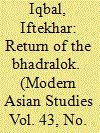

|
|
|
|
|
| Summary/Abstract |
Since the late 1970s, historical studies of colonial Bengal have been dominated by the recurrent theme of the 'return of the peasant', generally set against the previously predominant notion that British-created landlords were omnipotent agents of agrarian relations. Although the new historiography restores agency to the peasant, it seeks to attribute the agrarian decline in the late colonial Eastern Bengal, roughly Bangladesh, to the 'rich peasant'. It is argued that the rich peasant wielded hegemonic authority on their poor fellow co-religionists by forging a 'communal bond', while exploiting them from within. Such development is often considered linked to the separatist idea that offered a 'peasant utopia' in the form of Pakistan against perceived Hindu domination. This article, while not altogether denying the role of the rich peasant, argues that the bhadralok, or the non-cultivating middle-class gentry, were far more powerful as a catalyst in agrarian relations in Eastern Bengal than is conceded in contemporary historical debates. In so arguing, this article re-examines the post-structuralist turn that appeared to replace the classical Marxist paradigm of class by that of culture and consciousness.
|
|
|
|
|
|
|
|
|
|
|
|
|
|
|
|
| 4 |
ID:
186154
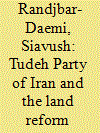

|
|
|
|
|
| Summary/Abstract |
This article seeks to explore the reaction and attitude of the Tudeh Party of Iran to the land reform initiatives enacted by the Pahlavi state between 1958 and 1964. This article will in particular describe how the party analysed the various stages of the land reform programme through both its lively media operation and internal party documents. Based on a close reading of this material, this article will also focus on how the exiled party’s attitude with regards to the Pahlavi state and other contemporary political actors affected its opinion of the rise to prominence of Ayatollah Ruhallah Khomeini in the midst of the land reform programme. The article will hence conclude by offering a new account of the Tudeh’s initial attitude to Khomeini’s initiatives from the 15 Khurdad uprising to the cleric’s exile and gauge the extent to which the same was informed by the previous analysis of the land reform initiatives.
|
|
|
|
|
|
|
|
|
|
|
|
|
|
|
|
| 5 |
ID:
177277
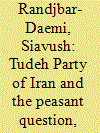

|
|
|
|
|
| Summary/Abstract |
This article will examine the Tudeh Party of Iran’s (TPI) attitude and agency towards the peasant question between its foundation in 1941 and the end of the party’s ability to operate in the domestic political scene in 1953. Based on a close reading of party printed material and other relevant primary sources from those dozen years, the study will analyse the TPI’s attempt to formulate a coherent and practicable stance on the pressing issue of the amelioration of the peasant condition during the early stages of its formation and develop a lasting presence, with varying degrees of success, within the large peasant contingent of the Iranian population of the time until the August 1953 coup d’état which brought an end to the activities of the party’s front organisations, including the body devoted to the peasant question.
|
|
|
|
|
|
|
|
|
|
|
|
|
|
|
|